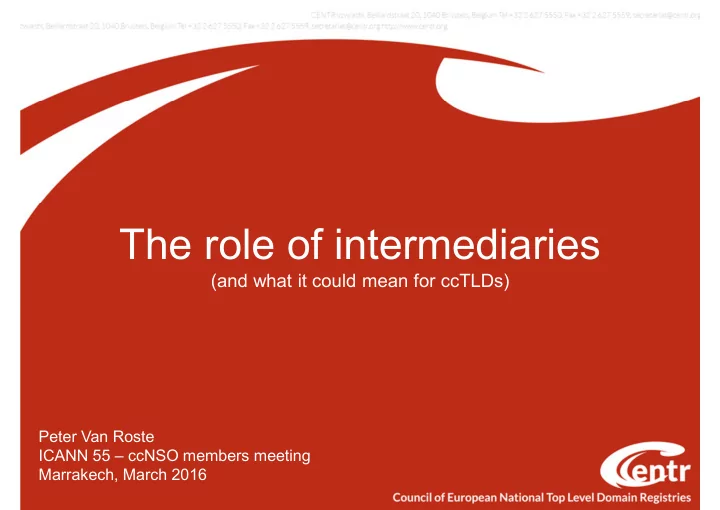

The role of intermediaries (and what it could mean for ccTLDs) Peter Van Roste ICANN 55 – ccNSO members meeting Marrakech, March 2016
PVR1 Observations European Parliament resolution of 25 November 2015 on the prevention of radicalisation and recruitment of European citizens by terrorist organisations (2015/2063(INI)) European Commission Security Agenda: Communication from the commission to the European parliament, the council, the European economic and social committee and the committee of the regions the European agenda on security. European Commission Fact Sheet European Agenda on Security - State of Play European Commission survey on Regulatory environment for platforms, online intermediaries, data and cloud computing and the collaborative economy (“Platform consultation”) Consumer Safety Network Sub-Group “Safety of Products sold online” (December 2015) EU Internet Forum December 2015. PSWG GAC meeting in Brussels January 2016 Healthy Domains Summit February 2016
Slide 2 PVR1 Peter Van Roste, 02/02/2016
Observations Other occurences of this issue DOTCOM act (Link) The Manila Principles (Link), also discussed during an IGF session Public safety and other debates @ ICANN: (e.g. Internet pharmacies) Numerous debates @ IGF: (e.g. Opening Ceremony) General Data Protection Regulation: consequences for intermediaries: (Link) ICANN 55 PSWG – RIRs WHOIS Court cases Sweden: ISPs blocking the Pirate Bay (Link) Germany: Liability of access providers (Link) USA: liability of access providers (Case 1:14-cv-01611 full verdict not published yet)
CENTR survey – December 2015 – 24 respondents - 67% don’t’ categorise illegal content however those that do, most act differently according to the category. - 70% have not been involved in voluntary removal of domain names to restrict access to content. - 38% participate in some form of national/EU/international initiative to block/take down illegal content. - 46% have at some point received a court order to take action or restrict access to content. - 46% have been a party to a legal action related to content. Most actions (82%) relate to IPR infringements. - The most common origin of legal action is law enforcement agencies and/or private companies. - 61% stated they do not consider their ccTLD to be an intermediary in the sense of the E-Commerce Directive.
THANK YOU FOR LISTENING! peter@centr.org www.centr.org
Recommend
More recommend